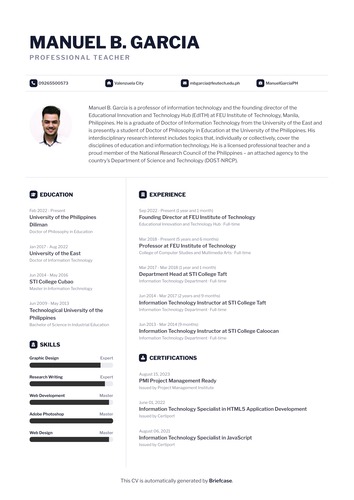Are you ready to introduce yourself?
Show the world what you're made of 💪
Effortlessly showcase your accomplishments because being awesome 😎 deserves a spotlight.
Create
Effortlessly build an online portfolio to showcase your accomplishments.
Share
Share your online portfolio and broadcast your successes to the world.
Connect
Expand your professional circle and forge meaningful relationships.
Building Your Career, One CV at a Time
Create Your Professional CV
Say goodbye to the hassle of manual formatting and updates, and start elevating your professional journey with Briefcase's automatic CV generator.
Seamlessly convert your achievements, skills, and experiences into a polished document suitable for job applications, interviews, and networking.


Streamlined Process
Save time and effort by automatically converting your online portfolio content into a well-structured CV.
Professional Formatting
Your CV will maintain a professional look and feel, ensuring you make a strong impression on potential employers.
Versatile Usage
Use your CV for job applications, networking, or any situation where you need to showcase your qualifications.
Always Up-to-Date
Your CV stays current with your latest achievements as you update your portfolio, eliminating the need for manual updates.
Spotlight on Briefcase Users
Here are a few of the incredible tamaraws who have embraced our platform to showcase their skills and accomplishments.
John Francis A. Acar
Aspiring Civil Engineer with a Strong Foundation in Problem Solving
Kent Seth A. Batucan
1st Year Freshman in FEU Institute of Technology
Miro Angelo G. Matullano
BSCE student at FEU Institute of Technology
Jaycee Paul C. De Leon
BSITCST student at FEU Institute of Technology
Jan Angelo P. Segador
Ambitious and Passionate Multimedia Arts Student with a Fresh Perspective
Jaychris Georgette Y. Onia
ME associate at FEU Institute of Technology
Marco S. Gonzales
BSCPE student at FEU Institute of Technology
Nathaniel T. Torre
BSITWMA student at FEU Alabang
Frequently Asked Questions
Ready to show the world?
Join the movement of tamaraws who showcase their accomplishments and show the world what they're made of.
Get started — it’s freeJoin 18891 tamaraws today and start showcasing.

